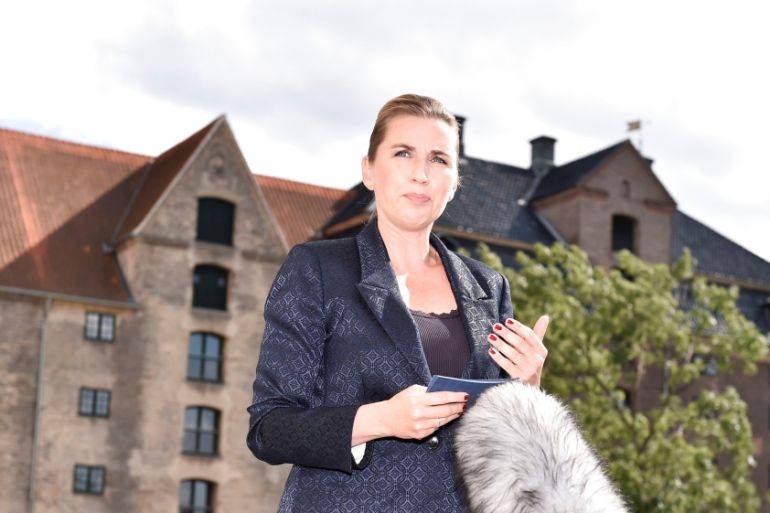Baffled Danes mock Trump after he scraps trip over Greenland
Many Danes, including politicians, condemn Trump after he cancels visit following Denmark’s refusal to sell island.

President Donald Trump‘s decision to call off a planned visit to Denmark after its refusal to sell Greenland to the United States has been met with condemnation and mockery by politicians and the public in Copenhagen.
Speaking to reporters on Wednesday, Danish Prime Minister Mette Frederiksen expressed surprise and disappointment following Trump’s move the previous day but reiterated that Greenland, an autonomous Danish territory, was not for sale.
Keep reading
list of 4 itemsCohen faces more cross-examination as Trump’s trial enters final stretch
Key takeaways from day 18 of Donald Trump’s New York hush money trial
Who benefits from US tariffs on Chinese imports? Experts weigh in
“A discussion about a potential sale of Greenland has been put forward. It has been rejected by Greenland premier Kim Kielsen, and I fully stand behind that rejection,” said Frederiksen, who had previously described the idea of any such deal as “absurd”.
The prime minister, however, said the cancellation of the trip “does not change the character of our good relations and we will of course continue our ongoing dialogue” with the US, a NATO ally.
Later on Wednesday, Trump told reporters at the White House that Frederiksen’s refusal to consider negotiations for the world’s largest island was “nasty”.
“It was not a nice way of doing it. She could have just said no, we’d rather not do it,” Trump said. “She’s not talking to me, she’s talking to the United States of America. They can’t say: ‘How absurd.'”
‘Deeply insulting’
At first, Trump’s proposal had elicited incredulity and humour from politicians in Denmark, with former Prime Minister Lars Lokke Rasmussen saying: “It must be an April Fool’s Day joke.” But the mood shifted to bewilderment following the US president’s decision to scrap the September 2-3 visit.
Writing on Twitter, former Prime Minister Helle Thorning-Schmidt said the US president’s comments were “deeply insulting to the people of Greenland and Denmark”.
So the POTUS has cancelled his visit to Denmark because there was no interest in discussing selling Greenland @BBCRadio4 Is this some sort of joke? Deeply insulting to the people of Greenland and Denmark.
— Helle Thorning S (@HelleThorning_S) August 21, 2019
Morten Ostergaard, leader of the Social Liberal Party, said: “Reality transcends imagination. It shows, more than ever, why we should consider the EU countries our greatest allies.”
Rasmus Jarlov, a member of the opposition Conservative Party, said Trump should “show more respect”, while simultaneously voicing his disbelief over the plans.
“Are parts of the US for sale? Alaska?” he wrote.
As a Dane (and a conservative) it is very hard to believe. For no reason Trump assumes that (an autonomous) part of our country is for sale. Then insultingly cancels visit that everybody was preparing for.
Are parts of the US for sale? Alaska?
Please show more respect.
🇩🇰🇬🇱🇺🇸— Rasmus Jarlov (@RasmusJarlov) August 21, 2019
Greenlandic politician Aaja Chemnitz Larsen said: “Good that Denmark has rejected Circus Trump”.
Both the current and former leaders of the Danish People’s Party, Kristian Thulesen Dahl and Pia Kjaersgaard, called out Trump, too.
Thulesen Dahl described the incident as a “farce”, while Kjaersgaard said Trump’s behaviour was “rude”.
Earlier in the week, the US president himself also ridiculed Greenland, posting on social media a doctored image of the island with a Trump tower.
I promise not to do this to Greenland! pic.twitter.com/03DdyVU6HA
— Donald J. Trump (@realDonaldTrump) August 20, 2019
Ida Auken, member of parliament for the Danish Social Liberal Party, posted a video on Tuesday in which she tried to convince Trump, who has previously criticised wind energy, of investing more in wind turbines.
Mr President – Greenland is not for sale. But Denmark has a much better deal for you! Watch this. #dkgreen #dkpol pic.twitter.com/mlRwAVzVFg
— Ida Auken (@IdaAuken) August 20, 2019
|
|
The trip to Denmark was part of a European tour that included a visit to Poland. Trump is still expected to visit Poland from August 31.
“Does anyone out there know if the government in Poland has definitively refused the US takeover of northern Poland?” Soren Espersen, a member of the Danish People’s Party, asked jokingly.
“Otherwise, watch out for Warsaw when @realDonaldTrump lands, because he is – after the Greenland fiasco – roaring hungry in search of a new Arctic,” he wrote on Twitter.
Social media users also poked fun at the developments.
Her Majesty Queen Margrethe of Denmark comforting an unknown foreign cry-baby #dkpol #GreenlandIsNotForSale #GreenlandUSA pic.twitter.com/en8Y277qWO
— PeerAagaard 🏳️🌈 🇩🇰 (@AagaardPeer) August 21, 2019
One account, created this month, showed a doctored image of the baby Trump balloon, used during anti-Trump protests in London earlier this year, as showing up in Greenland.
The nutjob woman in charge of Denmark won’t sell Greenland to me. Total loser! Sad! But I don’t care. All the fake news media are reporting that I won’t visit Denmak on September, but of course I will. See you there, losers! #dkpol #dkmedier #trumpbaby pic.twitter.com/yCqCTOTbZY
— Trump Baby Denmark (@DenmarkTrump) August 21, 2019
Twitter users in the Netherlands, meanwhile, offered to buy back Manhattan from the US. Manhattan was once a colonial Dutch trading post which came under the control of the British in the 17th century.
Dear @POTUS I would like to ask if we can buy New York, fka New Amsterdam back. It was a mistake to sell it and I think a lot of #NewYorkers would love to be a part of The Netherlands now. #GreenlandIsNotForSale #Denmark @MinPres pic.twitter.com/XwSyOpfUru
— Bram Derix (@BJDerix) August 21, 2019